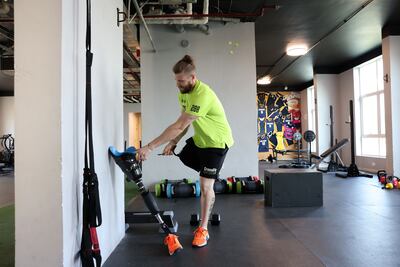Matthew Shepherd was a 20-year-old university student in the UK when he was diagnosed with a rare form of bone cancer which required a leg amputation.
Today, the Briton, 34, is working in Dubai and is one of the world's best CrossFit athletes in his field.
Mr Shepherd, a physics teacher at Repton Dubai, competed in the World Adaptive CrossFit Games in the US this year and finished in the top 10 in the lower above-knee category.
“In 2010, I was diagnosed with an osteosarcoma, which is a type of bone cancer and, through treatments, I had my leg amputated in February 2010,” Mr Shepherd told The National. “There have been challenges since then such as getting used to having a prosthetic leg.
“There were physical challenges and then there were people. People react differently to you. So, if I would be walking on the street with a little bit of a limp, I would notice people looking at me, and it was just about adjusting to that.”
A culmination of years of hard work
Mr Shepherd said he did not let challenges stand in his way and, even though he had to adapt different exercises, he kept trying every year until he qualified in the World Adaptive CrossFit Games this year.
After Mr Shepherd was diagnosed with osteosarcoma in January 2010, he soon started chemotherapy and had his leg amputated. He took a year out of university and then went back to finish his degree before starting a career as a teacher. Having lived and worked in the UAE since 2016, his message is a simple one: “Don't let people ever tell you, you can't do anything.”
“You can take part in gym classes, you can play sport, you can do all these things. It's just a case of getting out there and having the confidence to do it,” he said. “There have been instances where people have told me that I can't do something, or I won't be able to do it. Hopefully, by taking part in this competition, I have shown that I can do this.”
What is Adaptive CrossFit?
CrossFit is a high-intensity fitness programme which includes elements of various exercises. Adaptive CrossFit is a variation of CrossFit exercises, which have been designed to be suitable for athletes with physical or neurological impairments.
For the World Adaptive CrossFit Games this year, where Mr Shepherd entered the top 10, he had to film himself doing various exercises within a certain time limit to qualify. One such exercise is the double-sided coin – where the athlete has to carry out 16 alternative dumbbell snatches, 16 burpees, 16 ring dips and then as many barbell snatches as possible within six minutes.
“I started going to a CrossFit class in 2019 and I've been going there pretty much five times a week ever since. I wanted to do something because I was a little overweight,” he said.
“Since I started, I have been involved in doing the online stages of the CrossFit Games and only in the last sort of three or four years have they introduced an adaptive category. I've been improving every year, but this year was the first year where I was able to take it a bit more seriously with a view to qualifying.
“I was just really proud, and I was really thankful to the school for letting me go to compete.”
The 2024 Adaptive CrossFit Games featured 15 divisions from upper impairment to lower impairment to intellectual disabilities.

'Anyone can do anything'
Mr Shepherd believes that people can “get into a little bit of a rut” after a traumatic experience but that, the way the CrossFit competition was organised and the number of people with impairments and different disabilities who participated “just shows that anyone can do anything”.
“It should not be something that holds people back. You should be able to compete and participate,” he said. “I think there needs to be not just a mindset from people with impairments to get out and do something, but also a mindset of people who run teams and clubs and gyms, that there are people with impairments who want to take part, and they can excel.”
“Seeing Matt in the top 10 was amazing. It was such a proud moment,” Adrian Hughes, Mr Shepherd’s coach, said. “Matt's journey has been inspiring. His mental toughness is what really helped him reach that global level.”

